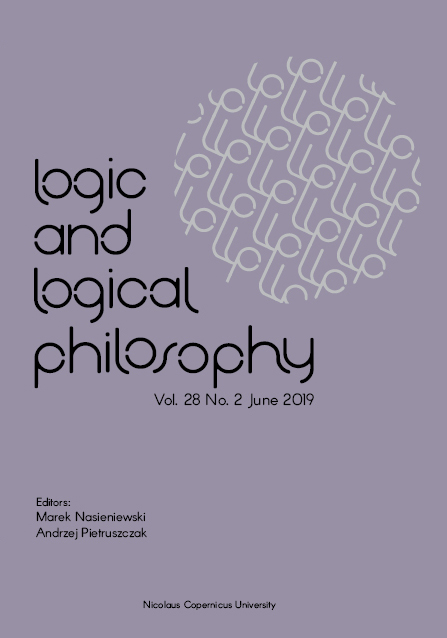A “Distributive” or a “Collective” Approach to Sentences?
DOI:
https://doi.org/10.12775/LLP.2019.011Keywords
content implication, pluripropositionalism, Suszko’s identity, liar sentence, liar antinomy, Buridan, Prior, Grice’s implicature, definition of truthAbstract
It is a well-known fact that the Russell’s antinomy arises within distributive set theory whereas it does not do so within collective set theory. n this paper, I shall propose what I shall call a “collective” understanding of a sentence as opposed to the standard, truth-functional approach which I shall term a “distributive" approach. Similar to the case with sets, the liar antinomy appears when the liar sentence is treated distributively. If, however, the sentence is understood collectively, then the liar antimony does not appear.
References
Bloom, S.L., and R. Suszko, 1972, “Investigations into the sentential calculus with identity”, Notre Dame Journal of Formal Logic 13 (3): 289–308. DOI: http://dx.doi.org/10.1305/ndjfl/1093890617
Le Fèvre d’Etaples, J., 1520, Jacobi Fabri Stapulensis artificiales nonnulle introductiones per Iodocum Clichtoveum in unum diligenter collecte, Parisius.
Gilbert, D.T., D.S. Krull and P.S. Malone, 1990, “Unbelieving the unbelievable: Some problems in the rejection of false information, Journal of Personality and Social Psychology 59 (4): 601–613. DOI: http://dx.doi.org/10.1037/0022-3514.59.4.601
Gilbert D.T., R.W. Tafarodi and P.S. Malone, 1993, “You can’t not believe everything you read”, Journal of Personality and Social Psychology 65 (2): 221–233. DOI: http://dx.doi.org/10.1037/0022-3514.65.2.221
Grice, H.P., 1975, Logic and Conversation, Syntax and Semantics, vol. 3, P. Cole and J. Morgan (eds.), Academic Press. Reprinted as chapter 2, pages 22–40, of Grice Studies in the Way of Words, Harvard University Press, 1989.
Łukowski, P., 1996, “Modal interpretation of Heyting-Brouwer logic”, Bulletin of the Section of Logic 25 (2): 80–83.
Łukowski, P., 1997, “An approach to the liar paradox”, pages 68–80 in New Aspects in Non-Classical Logics and Their Kripke Semantics, RIMS: Kyoto University.
Łukowski, P., 2002, “A deductive-reductive form of logic: General theory and intuitionistic case”, Logic and Logical Philosophy 10: 59–78. DOI: http://dx.doi.org/10.12775/LLP.2002.004
Łukowski, P., 2006, Paradoksy, Łódź: Wydawnictwo Uniwersytetu Łódzkiego.
Łukowski, P., 2011, Paradoxes, Dordrecht-Heidelberg-London-New York: Springer. DOI: http://dx.doi.org/10.1007/978-94-007-1476-2
Mills, E., 1998, “A simple solution to the liar”, Philosophical Studies 89: 197–212.
Mills, E., 2008, “Schaming and lying”, pages 113–128 in [Rahman et al., 2008]. DOI: http://dx.doi.org/10.1007/978-1-4020-8468-3_6
Parsons, T., 2008, “Comment’s on Stephen Read’s The truth schema and the liar”, pages 129–134 in [Rahman et al., 2008]. DOI: http://dx.doi.org/10.1007/978-1-4020-8468-3_7
Prior, A.N., 1961, “On a family of paradoxes”, Notre Dame Journal of Formal Logic 2 (1): 16–32.
Rahman S., T. Tulenheimo and E. Genot (eds.), 2008, Unity, Truth and the Liar: The Modern Relevance of Medieval Solutions to the Liar Paradox, Springer. DOI: http://dx.doi.org/10.1007/978-1-4020-8468-3
Rauszer, C., 1974, “Semi-Boolean algebras and their applications to intuitionistic logic with dual operations”, Fundamenta Mathematicae LXXXIII: 2019–2249.
Rauszer, C., 1980, “An algebraic and Kripke-style approach to a certain extension of intuitionistic logic”, Dissertationes Mathematicæ CLXVII, PWN, Warszawa.
Read, S., 2008, “The truth schema and the liar”, pages 3–17 in [Rahman et al., 2008]. DOI: http://dx.doi.org/10.1007/978-1-4020-8468-3_1
Simons, P., 2015, “Stanisław Leśniewski”, The Stanford Encyclopedia of Philosophy, Winter 2015 Edition, E. N. Zalta (ed.), https://plato.stanford.edu/archives/win2015/entries/lesniewski/.
Suszko, R., 1975, “Abolition of the Fregean axiom”, Lecture Notes in Mathematics 453: 169–239.
Tworak, Z., 2004, Kłamstwo kłamcy i zbiór zbiorów. O problemie antynomii, Wydawnictwo Naukowe UAM, Poznań.
Wittgenstein, L., 2015, Tractatus-Logico-Philosophicus, Side-By-Side-By-Side Edition, Version 0.42 (January 5, 2015), containing the original German, alongside both the Ogden/Ramsey, and Pears/McGuinness English translations. PDF file available at http://people.umass.edu/klement/tlp/
Woleński, J., 1992, “Konsekwencje odrzuceniowe i porównywanie teorii”, Zeszyty Naukowe Wyższej Szkoły Pedagogicznej w Opolu, Matematyka 28: 107–111.
Woleński, J., 1995, “Logika i fałsz”, pages 161–176 in J. Perzanowski, A. Pietruszczak and C. Gorzka (eds.), Filozofia/logika. Filozofia logiczna 1994, Wydawnictwo UMK, Toruń.
Wójcicki, R., 1973, “Dual counterpart of consequence operations”, Bulletin of the Section of Logic 2 (1): 54–57.
Downloads
Published
How to Cite
Issue
Section
Stats
Number of views and downloads: 898
Number of citations: 1







